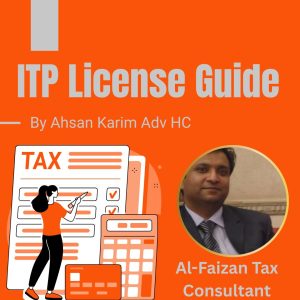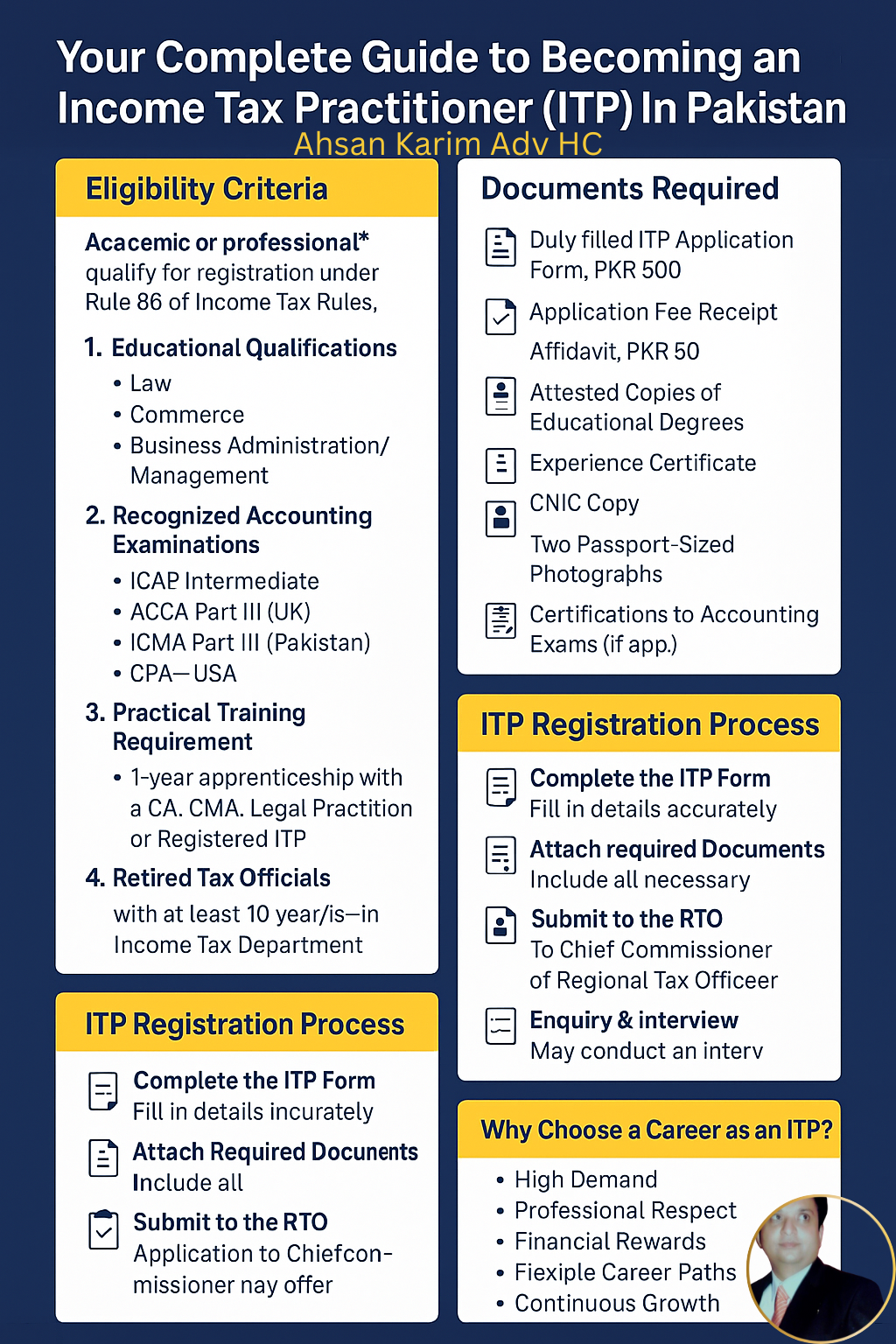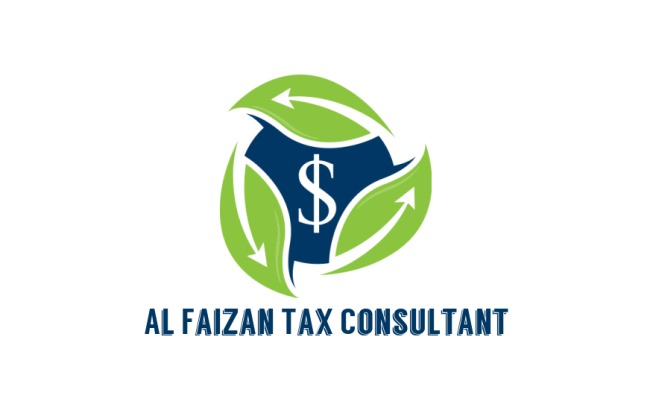Your Complete Guide to Becoming an Income Tax Practitioner (ITP) in Pakistan
Today i have decided to write a detailed guide about getting ITP license from FBR in Pakistan. This is the first of its type comprehensive guide in Pakistan. I Ahsan Karim advocate high court hope that you will like and share this ITP guide. Embarking on the journey to become an Income Tax Practitioner (ITP) in Pakistan is a rewarding decision for professionals seeking to contribute to the country’s taxation system by guiding individuals and businesses through their tax responsibilities. Whether you are a fresh graduate, a legal or finance professional or a retired income tax officer, this path offers not only professional credibility but also the chance to make a tangible impact.
All About Getting ITP License (Income Tax Practitioner) in Pakistan From FBR

This comprehensive guide covers the eligibility criteria, qualifications, application process, required documents, and practical steps to register with the Federal Board of Revenue (FBR) as a certified ITP.
Who is an Income Tax Practitioner (ITP)?
An ITP is a person registered under Section 223 of the Income Tax Ordinance, 2001, and authorized to prepare and file income tax returns, represent clients before the FBR, and offer expert tax advice. Their role is essential in helping taxpayers meet compliance obligations and navigate the complexities of tax laws in Pakistan.
ITPs serve as a vital bridge between the taxpayer and the taxation authorities, ensuring legal compliance and financial efficiency.
Eligibility Criteria for Becoming an ITP in Pakistan
As outlined in Rule 86 of the Income Tax Rules, 2002, to qualify for ITP registration with the FBR, an applicant must meet one of the following academic or professional criteria:
1. Educational Qualifications
You must hold one of the following degrees from a recognized Pakistani institution or a foreign university (with equivalence):
-
Law: At least a second division in LLB, providing you the legal foundation to interpret tax statutes.
-
Commerce: With subjects such as Income Tax Law and Accounting or Higher Auditing.
-
Business Administration/Management: Where Accounting and Taxation are integral parts of the curriculum.
-
Foreign Degrees: Must be recognized as equivalent by a local university or regulatory body.
2. Recognized Accounting Examinations
Alternatively, you may qualify through:
-
ICAP Intermediate Examination
-
ACCA Part III (UK)
-
ICMA Part III (Pakistan)
-
Certified Public Accountant (CPA) – USA
-
Any other intermediate accounting exam recognized by ICAP as equivalent
3. Practical Training Requirement
A mandatory one-year apprenticeship under any of the following professionals, each with a minimum of 10 years of registration:
-
Chartered Accountant
-
Cost and Management Accountant
-
Legal Practitioner (qualified to appear before civil courts)
-
Registered ITP
This apprenticeship provides hands-on exposure to tax filing, compliance procedures, and client interactions.
4. Alternative Path for Retired Tax Officials
An individual who served in the Income Tax Department for at least 10 years in a position not below that of an Income Tax Officer, and has since retired, is also eligible to register as an ITP.
Documents Required for ITP Registration with FBR
To apply for ITP registration, you need to compile the following documents:
-
Duly Filled Application Form: Obtainable from the FBR website or Regional Tax Office, as per Section 223 of the Income Tax Ordinance, 2001.
-
Application Fee Receipt: PKR 500 treasury receipt (non-refundable), deposited in the Government Treasury.
-
Affidavit: An attested affidavit (PKR 50 stamp paper) affirming eligibility and compliance with ITP rules.
-
Attested Copies of Educational Degrees: As proof of your qualifications.
-
Experience Certificate: Certifying one year of apprenticeship under an eligible practitioner.
-
CNIC Copy: Attested and clearly visible.
-
Two Passport-Sized Photographs
-
Additional Certifications (if applicable): For those qualifying via accounting exams.
Important: Ensure all documents are properly attested and organized, as incomplete submissions may be rejected.
ITP Registration Process: Step-by-Step
The process is governed by Rule 87 of the Income Tax Rules, 2002. Here’s how to apply:
Step 1: Complete the ITP Form
Fill in all details correctly. Obtain this from the FBR website or the nearest Regional Tax Office.
Step 2: Attach Required Documents
Include all documents listed above, especially your experience certificate and degree copies.
Step 3: Submit to the RTO
Submit your application to the Chief Commissioner of the Regional Tax Office where you reside or intend to practice.
Step 4: Enquiry & Interview
The Chief Commissioner may:
-
Conduct an inquiry into your background and eligibility.
-
Ask for clarification or additional documents.
-
Call you for an interview to assess your knowledge of tax laws, ethics, and practical scenarios.
Step 5: Approval or Rejection
-
If approved, your name will be entered in the official ITP Register, and you’ll be issued a certificate.
-
If rejected, the RTO will issue a written explanation. You can rectify the deficiencies and reapply.
Interview Preparation Tips for Aspiring ITPs
The interview plays a decisive role in the selection process. Here’s how to prepare:
-
Master the Income Tax Ordinance, 2001: Focus on sections related to tax filing, penalties, and assessments.
-
Analyze Practical Case Studies: Prepare to answer scenario-based questions.
-
Join a Training Program: Enroll in an ITP preparation course to gain deeper insights and mock interview practice.
-
Stay Updated: Be aware of the latest tax amendments and FBR policies.
-
Practice Communication: Express yourself clearly and confidently in front of a panel.
Duration and Termination of ITP Registration
Once registered, your ITP status is valid indefinitely, but it can be terminated under the following circumstances:
-
Voluntary Surrender: You may submit a written notice to the Chief Commissioner to surrender your registration.
-
Death of the Practitioner
-
Termination by Authority: The Chief Commissioner may cancel registration if you:
-
Violate tax laws or ITP rules.
-
Engage in professional misconduct.
-
Fail to meet compliance standards.
-
To maintain your registration, stay compliant, avoid malpractice, and continue professional development.
Why Choose a Career as an ITP?
-
High Demand: Pakistan’s expanding tax base demands qualified professionals.
-
Professional Respect: Gain credibility in both public and private sectors.
-
Financial Rewards: As your clientele grows, so does your income.
-
Flexible Career Paths: Work independently or as part of a consultancy.
-
Impactful Service: Help individuals and businesses meet legal obligations while optimizing their financial health.
-
Continuous Growth: Stay intellectually engaged with ever-evolving tax laws.
Final Thoughts
The journey to becoming an Income Tax Practitioner in Pakistan is demanding but immensely fulfilling. It’s a blend of academic qualifications, practical experience, and procedural diligence. By following this roadmap, staying updated with tax regulations, and preparing thoroughly for your interview, you can position yourself as a trusted tax advisor in Pakistan’s financial ecosystem.
If you’re ready to start, gather your documents, check your qualifications, and set your goal to join the ranks of certified ITPs. Your career in tax practice is just a few steps away. This guide has been written after deep research since to err is human and we shall welcome any positive criticism for our correction. Stay blessed always and always.
What Information Do Banks Share with FBR?


I H.Dr Ahsan Karim is an advocate high court and old Ravian. I did my LLB from Punjab University Lahore in 2002. I am working as webmaster and social media manager too in Al-Faizan Tax Consultant. I have written more than 7000 articles on various topics.
